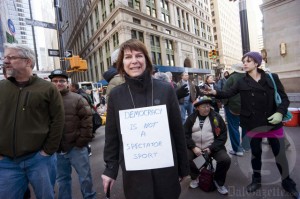Finding your place in the Occupy movement
Whether American or Canadian, homeless or comfortably living in your country estate, chances are you are part of the 99 per cent.
But what does that mean? Does it mean you should immediately leave your house, job and family, grab a loudspeaker and tent, and join the movement?
To me, the biggest challenge with the Occupy movement is finding your place in the 99 per cent—occupying the movement as a whole. I think the confusion that threatens the organization of Occupy stems from an inability to find one’s place in the movement.
Last week, I ventured to Wall Street on assignment for the Gazette. At 9:00 p.m. I arrived at Zuccotti Park and was quickly ushered to what appeared to be the last remaining tent space, right in the center of it all. Not only did I feel lost in a literal sense—having no idea where in New York I was—but I also felt lost among the 99 per cent.
Everyone there had a purpose from the kitchen volunteers, the bookkeeper, the drummers, leaders of the marches, to those holding the loudspeakers. There was even a man assigned to look after dogs and cats in the park, and a woman whose sole purpose was to give out free hugs. It was overwhelming.
As I drifted in and out of sleep, I could hear the sound of the NYPD’s radios as police officers walked past my tent. I couldn’t help but sympathize with the police how conflicting it must be for them at this time. After all, they are part of the 99 per cent too.
A letter released by the Oakland Police Officer’s Association on Nov. 11 was rife with confusion and conflict. On one hand, the police recognized that they were part of the 99 per cent, but on the other hand, they were unable to perform their duties to serve and protect the public because the Occupy movement was pulling police away from Oakland, California neighborhoods.
It can be so easy to see the police as “enemies of the movement” when they stand in a pristine Grand Parade following the day of eviction, but we need to recognize the part they play in the movement as well: security.
After wandering around Zuccotti Park and the rest of New York for a few days, I started to get a sense of the 99 per cent. Not everyone is able to camp out and not everyone wants to. For some, simply offering support to the movement—whether through food or clothing donations—is enough. For others, their part in the 99 per cent is to write letters to politicians to try and affect change.
Back in Halifax, I spoke to a number of veterans as Remembrance Day approached. Many recognized that they were part of the 99 per cent too, but disagreed with other aspects of the movement, such as camping out in Grand Parade on Remembrance Day. They were conflicted, and the conflict drew them away from the movement.
In New York, the BBC interviewed a number of construction workers building Tower 4 at Ground Zero, blocks from Zuccotti Park. They too knew they were part of the 99 per cent, but they couldn’t wait for protesters to leave Zuccotti Park so they could get their lunch-hour park back.
For me, as a journalist and a member of the 99 per cent, this struggle follows me in my reporting of the Occupy movement. Is it possible to be unbiased writing about the 99 per cent, while camping out in Zuccotti Park, with my bills are stacking up at home? I’m not sure.
So I am asking you, the activists, those who know their place in this movement, to be patient with the rest of us. Remember, you are lucky. Don’t be too critical of those who are conflicted and still finding their place. “The 99 per cent” is an awful lot of people. One could almost get lost among them.



Recent Comments